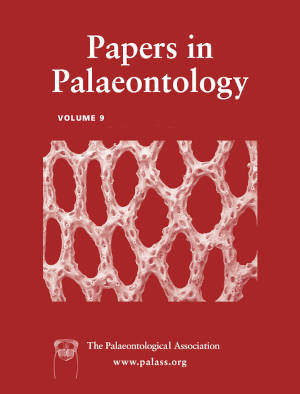Article: A giant phytosaur (Diapsida, Archosauria) from the Upper Triassic of India with new insights on phytosaur migration, endemism and extinction
Publication: Papers in Palaeontology
Volume:
9
Part:
1
Publication Date:
2023
Article number:
e1476
Author(s):
Debajit Datta, and Sanghamitra Ray
DOI:
10.1002/spp2.1476
Abstract
Abstract A new Mystriosuchinae phytosaur, Colossosuchus techniensis, is described from the Upper Triassic Tiki Formation of India. Colossosuchus is diagnosed by multiple apomorphies, including a strongly downturned terminal rosette (c. 70°), closely spaced mediolateral band-like ornamentation on dorsal surface of the nasal, dorsolaterally oriented supratemporal fenestra, ventrolaterally inclined postorbital–squamosal bars depressed below the skull table, dorsally convex parietal–squamosal bar that descends ventrolaterally below the skull roof, dome-shaped skull in lateral view, prominent neural arch laminae and fossae, three sacral vertebrae, robust proximal end of the tibia, and fibula with high anteroposterior flaring of the distal end. The total body length of the largest individual recovered from the bonebed is estimated to be more than 8 m, suggesting that Colossosuchus is one of the largest phytosaurs known. Phylogenetic analysis nests Colossosuchus and other undescribed specimens from India within Mystriosuchinae. These form a distinct clade and represent the earliest record of endemism among Gondwanan phytosaurs. This clade is recovered as sister taxa to ((Volcanosuchus + Rutiodon) + Leptosuchomorpha), where the depressed supratemporal fenestra first appeared in the phytosaur lineage, a feature previously used to diagnose the derived leptosuchomorphs. Early-diverging phytosaur diversification may have coincided with the final stages of the Carnian Pluvial Event with their possible migratory routes along the circum-Tethyan coastline. The lineage continued to evolve mostly through endemic radiations and experienced an extinction event during early Norian, which marked the disappearance of most of the non-leptosuchomorph taxa. This is attributed to post-CPE aridification, although more study is required.
